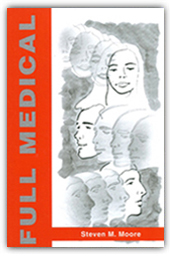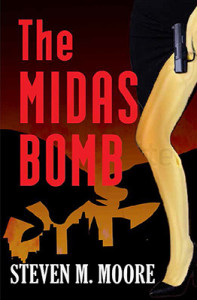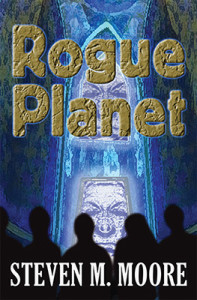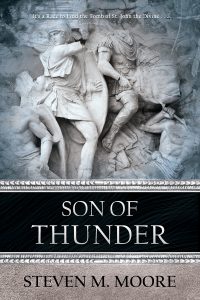My “quick books”…
I published my first novel, the sci-fi thriller Full Medical, in 2006 (it now has an ebook second edition). I usually publish two or three novels per year, so you can do the math. (A. B. Carolan allows me to count his—wink, wink.)

Some novels are long; some are short, but they’re not novellas. Some I spend a lot of time writing, especially one I did with a small press. (Generally speaking, they’re usually responsible for publication delays, not the writers.) Generally speaking, time from start to published book isn’t all in the writing. Even for a long book, though, the writing time can be very short. I call those “quick books”; mine also are all “evergreen” now (i.e. as current and entertaining as the day I finished their manuscripts), but that could change.
Perhaps it’s the hounding by my muses (“banshees with Tasers” is a better description—they seem to know how many stories I have left in me!), or characters just taking over to tell their own stories, but I remember these quick books well. Writing them was akin to the Iguazu Falls at the corner of Argentina, Brazil, and Paraguay, with the words gushing forth to form giant artistic cataracts from my thoughts.

The first quick book, and still the winner, is The Midas Bomb (now with a second edition in both ebook and print format—forget that old Infinity Publishing POD!). Here I introduce detectives Chen and Castilblanco. The latter has just lost two young partners, so he’s leery about teaming up with another one, namely Chen. (He actually met her as a patrolwoman during his first homicide case—see “The Case of the Carriageless Horse” in the collection World Enough and Crime. Donna Carrick reads that short story on her podcast—see my “Home Page” at this website for details.) The Midas Bomb is a mystery/thriller, not sci-fi, and has the sleuths chasing several smart criminals. (The title is also one of my best, hinting at two parallel crimes that are related.)

My second best quick book is Rogue Planet. I don’t know why this hard sci-fi novel, with Game-of-Thrones and Star-Wars flavors, didn’t resonate more with readers. Like most sci-fi, it will always be evergreen, and it serves as a bridge book for my extended “Future History” timeline between the “Chaos Chronicles Trilogy” and A. B. Carolan’s young adult sci-fi mysteries, especially the last one. Maybe readers would have preferred a Disney-like princess as protagonist instead of a rakish prince? I’m currently thinking about a sequel that would also be a sequel to A.B.’s Mind Games—that might be hard to pull off, but I always like a challenge. (Della from A.B.’s book isn’t a princess, but Prince Kaushal in Rogue Planet is one, and he married his princess Anju.)
My third quick book of note is Son of Thunder, #2 in the “Esther Brookstone Art Detective” series (also part of that “Future History,” come to think of it). It’s the only one mentioned so far that’s traditionally published, which proves the point that writing time spent differs greatly from publishing time waiting. (#3, Death on the Danube, had so many delays just to get a response to a query, possibly because of COVID, that I ended up publishing it myself. Its writing went fast too. It would compete with The Last Humans or its sequel, The Last Humans: A New Dawn, for the fourth spot on the quick-books list, proving yet another point—writing time doesn’t correlate well with book length, at least in my case.)

Readers might be surprised that Son of Thunder is #3 on my list of quick books because the novel is very complex, following three independent stories about St. John (biblical times), Boticelli (Renaissance), and Esther (near future), and then bringing everything together. It’s not only complex, it’s my deepest book, considering the themes treated, which, of course, adds to the complexity, so it surprised even me that its writing went so fast. (Oh yes, it also required finding the most background material out of the three!) Not even with COVID, did I write so much so quickly. (I submitted it to the publisher long before it was published in 2019.)
Is there a difference in quality between these three quick books and the rest of my oeuvre? I doubt it. They might just be better, though, because of a phenomenon known better to artists when they are painting: The more they work on a painting, the muddier the colors can often become! Those first strokes on the canvas and those first words that come streaming out of a writer’s head to land on the page are often the best. I believe most authors will tell you that some novels come easier than others, which means the same thing. And that doesn’t mean the quality is less; it might be better.
One thing is certain: I didn’t choose to write these novels quickly. It just happened. I don’t recommend that any author establish a time limit for writing a novel. That’s silly. And any agent or publisher who tries to impose such a constraint might just receive a manuscript of poor quality, what neither they nor readers want.
***
Comments are always welcome.
New books. Like I said above, A.B. and I usually publish two or three new books per year. Two novels’ manuscripts are now waiting offstage: A.B. Carolan will start a new trilogy with Origins, a sci-fi mystery that goes far back into prehistory as well as into the near future. Its protagonist is a young STEM girl. Palettes, Patriots, and Prats, #4 in the Brookstone series, finds Esther and new hubby Bastiann back home in London but still getting into trouble. It all takes place in merry old England and Scotland. Watch for them. (Both were written fast because of COVID.)
Around the world and to the stars! In libris libertas!
